| Listing 1 - 9 of 9 |
Sort by
|

ISBN: 0700716327 0700716319 Year: 2002 Publisher: London RoutledgeCurzon
Abstract | Keywords | Export | Availability | Bookmark
 Loading...
Loading...Choose an application
- Reference Manager
- EndNote
- RefWorks (Direct export to RefWorks)
Although 'Seibutsu no Sekai (The World of Living Things)', the seminal 1941 work of Kinji Imanishi, had an enormous impact in Japan, both on scholars and on the general public, very little is known about it in the English-speaking world. This book makes the complete text available in English for the first time and provides an extensive introduction and notes to set the work in context. Imanishi's work, based on a very wide knowledge of science and the natural world, puts forward a distinctive view of nature and how it should be studied. Imanishi's work is particularly important as a background to ecology, primatology and human social evolution theory in Japan.
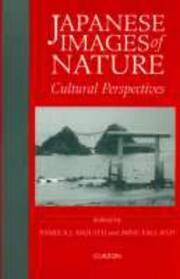
ISBN: 0700704450 9780700704453 Year: 1997 Publisher: Richmond Curzon
Abstract | Keywords | Export | Availability | Bookmark
 Loading...
Loading...Choose an application
- Reference Manager
- EndNote
- RefWorks (Direct export to RefWorks)
J7510 --- J4140 --- Japan: Natural sciences and technology -- biology -- ecology (general) --- Japan: Sociology and anthropology -- cultural history --- Philosophy of nature. --- Philosophie de la nature --- Nature (Esthétique) --- Philosophie de la nature. --- Nature --- Opinion publique --- Opinion publique. --- Japan --- Japon --- Civilization. --- Civilisation --- Civilisation. --- J4150 --- Japan: Science and technology -- biology -- ecology (general) --- Japan: Sociology and anthropology -- customs, folklore and culture -- general and history
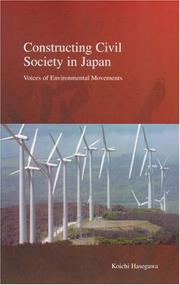
ISBN: 187684373X 1876843675 9781876843670 9781876843731 Year: 2004 Volume: 3 Publisher: Melbourne Trans Pacific
Abstract | Keywords | Export | Availability | Bookmark
 Loading...
Loading...Choose an application
- Reference Manager
- EndNote
- RefWorks (Direct export to RefWorks)
Based on four major case studies, this book offers an overview of contemporary Japan's changing attitudes and policies regarding environmental issues. Beginning in the 1970s, the author traces how the rapid growth of environmental politics and actions contributed to the development of a vibrant civil society.
Green movement --- Environmental sciences --- Environmental policy --- Ecologisme --- Sciences de l'environnement --- Environnement --- Social aspects --- Aspect social --- Politique gouvernementale --- Environmentalism --- Citizen participation --- JP / Japan - Japon --- 355 --- 323.5 --- J4419 --- J4010 --- J7510 --- Milieu --- Pressiegroepen. Lobbying. --- Japan: Economy and industry -- industrial organization and relations -- industry and society and environment --- Japan: Social sciences in general -- ideology, socio-political and socio-economic movements --- Japan: Natural sciences and technology -- biology -- ecology (general) --- Pressiegroepen. Lobbying --- Japan: Science and technology -- biology -- ecology (general) --- Environmental sciences - Social aspects --- Environmental policy - Japan - Citizen participation --- Écologisme --- Politique de l'environnement --- Japon --- Participation des citoyens
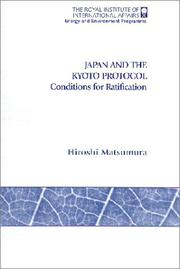
ISBN: 1862031258 186203124X Year: 2000 Publisher: London Royal institute of international affairs
Abstract | Keywords | Export | Availability | Bookmark
 Loading...
Loading...Choose an application
- Reference Manager
- EndNote
- RefWorks (Direct export to RefWorks)
Air --- Air quality management --- Emissions trading --- Carbon dioxide mitigation --- Climatic changes --- Echange de droits d'émission (Environnement) --- Gaz carbonique --- Climat --- Pollution --- Economic aspects --- Government policy --- Aspect économique --- Qualité --- Gestion --- Politique gouvernementale --- Réduction --- Changements --- United Nations Framework Convention on Climate Change --- J4419 --- J7510 --- J4301 --- Japan: Economy and industry -- industrial organization and relations -- industry and society and environment --- Japan: Natural sciences and technology -- biology -- ecology (general) --- Japan: Economy and industry -- policy, legislation, guidelines, codes of behavior --- Echange de droits d'émission (Environnement) --- Aspect économique --- Qualité --- Réduction --- Japan: Science and technology -- biology -- ecology (general)
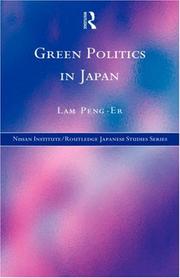
ISBN: 0415199387 Year: 1999 Publisher: London Routledge
Abstract | Keywords | Export | Availability | Bookmark
 Loading...
Loading...Choose an application
- Reference Manager
- EndNote
- RefWorks (Direct export to RefWorks)
Ecology --- Green movement --- Ecologie --- Ecologisme --- Political aspects --- Aspect politique --- Japan --- Japon --- Politics and government --- Politique et gouvernement --- -Environmental protection --- -Green movement --- -Japan --- -J4600.90 --- J7510 --- J4419 --- J4010 --- Ecologism --- Environmental action groups --- Environmental groups --- Environmentalism --- Political ecology --- Sustainable living --- Environmental quality management --- Protection of environment --- Environmental sciences --- Applied ecology --- Environmental engineering --- Environmental policy --- Environmental quality --- Balance of nature --- Biology --- Bionomics --- Ecological processes --- Ecological science --- Ecological sciences --- Environment --- Environmental biology --- Oecology --- Population biology --- -Politics and government --- -Japan: Politics and law -- history -- postwar Shōwa (1945- ), Heisei period (1989- ), contemporary --- Japan: Natural sciences and technology -- biology -- ecology (general) --- Japan: Economy and industry -- industrial organization and relations -- industry and society and environment --- Japan: Social sciences in general -- ideology, socio-political and socio-economic movements --- Environmental protection --- J4600.90 --- Japan: Politics and law -- history -- postwar Shōwa (1945- ), Heisei period (1989- ), contemporary --- Japan: Science and technology -- biology -- ecology (general)

ISBN: 9780521564243 9780511571060 9780521665742 0521564247 0521665744 0511571062 Year: 1998 Publisher: Cambridge : Cambridge University Press,
Abstract | Keywords | Export | Availability | Bookmark
 Loading...
Loading...Choose an application
- Reference Manager
- EndNote
- RefWorks (Direct export to RefWorks)
After World War Two, Japan attained economic growth but suffered environmental disaster. In response to massive protest in the 1960s and 1970s, the Japanese government rapidly reduced the worst air and water pollution. Jeffrey Broadbent's case study of industrial growth and pollution in a rural Japanese prefecture explains this response while testing political, social movement and environmental theory. The state, conservative political party and big business pushed rampant growth until movements posed a political and disruptive challenge. Then, the elites passed some pollution control, but also demobilized local protest, quashed discontent, and prevented the formation of national environmental groups. Without the protest threat, business stymied other government pollution-control plans. The interaction of material, institutional and cultural factors, especially informal institutions, explained the dominance of actors and the pattern of outcomes. Through this syncretic lens in a non-Western setting, this study refines our theories of the state, protest movements, political process, and environmental problems.
J4419 --- J4301 --- J7510 --- J4010 --- -Environmentalism --- -#SBIB:35H434 --- #SBIB:35H6089 --- Japan: Economy and industry -- industrial organization and relations -- industry and society and environment --- Japan: Economy and industry -- policy, legislation, guidelines, codes of behavior --- Japan: Natural sciences and technology -- biology -- ecology (general) --- Japan: Social sciences in general -- ideology, socio-political and socio-economic movements --- -Beleidssectoren: milieubeleid en ruimtelijke ordening --- Bestuur en beleid: nationale en regionale studies: Japan --- Environmental policy --- Environmentalism --- Human ecology --- Political aspects --- #SBIB:003.IO --- #SBIB:35H434 --- Ecology --- Environment, Human --- Human beings --- Human environment --- Ecological engineering --- Human geography --- Nature --- Environmental movement --- Social movements --- Anti-environmentalism --- Sustainable living --- Beleidssectoren: milieubeleid en ruimtelijke ordening --- Social aspects --- Effect of environment on --- Effect of human beings on --- Environmental protection --- Environnement --- Protection --- Politique gouvernementale --- Japan: Science and technology -- biology -- ecology (general) --- Greenwashing --- Social Sciences --- Anthropology

ISSN: 09215239 ISBN: 9004136266 9786610465248 1423712404 1280465247 9047402847 9789047402848 9789004136267 9781423712404 Year: 2004 Volume: v. 11. Publisher: Leiden; Boston : BRILL,
Abstract | Keywords | Export | Availability | Bookmark
 Loading...
Loading...Choose an application
- Reference Manager
- EndNote
- RefWorks (Direct export to RefWorks)
Quoting from a reader's report "this is an original and compelling synthesis of the environmental history of Korea and Japan." Taking the history of Japan and Korea and their environmental interactions from late Pleistocene down to about 1870 AD, the author makes a convincing case for viewing the two countries together, as a history, particularly when looking at their pre-industrial experiences. Drawing from a rare combination of knowledge of both countries, Conrad Totman reveals the extent of shared timing, substance, and dynamics in the political, social, and economic development of the two countries, and in their relationship to the ecosystem. With extensive bibliography, chronology, glossary, maps and graphs.A real must.
Human ecology --- Agriculture --- History --- Korea --- Japan --- Environmental conditions --- History. --- Environmental conditions. --- J7510 --- J4000 --- J8100 --- J8000 --- J4419 --- K9931 --- K9300 --- K9974 --- K9413.70 --- Japan: Natural sciences and technology -- biology -- ecology (general) --- Japan: Social sciences in general, social history --- Japan: Technology and industry -- agricultural technology --- Japan: Technology and industry -- general and history --- Japan: Economy and industry -- industrial organization and relations -- industry and society and environment --- Korea: Science and technology -- biology -- ecology --- Korea: Social sciences -- general, social and cultural history --- Korea: Science and technology -- technology -- biological and agricultural technology --- Korea: Economy and industry -- relations -- environment --- Ecology --- Ecologie humaine --- Environnement --- Histoire --- Environment, Human --- Human beings --- Human environment --- Ecological engineering --- Human geography --- Nature --- Farming --- Husbandry --- Industrial arts --- Life sciences --- Food supply --- Land use, Rural --- Social aspects --- Effect of environment on --- Effect of human beings on --- Nihon --- Nippon --- Iapōnia --- Zhāpān --- I︠A︡ponii︠a︡ --- Yapan --- Japon --- Japão --- Japam --- Mư̄ang Yīpun --- Prathēt Yīpun --- Yīpun --- Jih-pen --- Riben --- Government of Japan --- 日本 --- 日本国 --- Nipponkoku --- Nippon-koku --- Nihonkoku --- Nihon-koku --- State of Japan --- Япония --- Japani --- اليابان --- al-Yābān --- يابان --- Yābān --- Japonsko --- Giappone --- Japonia --- Japonya --- J7000 --- J7590 --- Japan: Science and technology -- general and history --- Japan: Natural sciences and technology -- biology -- biological and agricultural technology --- Japan: Science and technology -- biology -- biological and agricultural technology --- Japan: Science and technology -- biology -- ecology (general) --- Jepun --- Yapon --- Yapon Ulus --- I︠A︡pon --- Япон --- I︠A︡pon Uls --- Япон Улс
Book
ISBN: 9780870718014 Year: 2015 Publisher: Corvallis Oregon State University Press
Abstract | Keywords | Export | Availability | Bookmark
 Loading...
Loading...Choose an application
- Reference Manager
- EndNote
- RefWorks (Direct export to RefWorks)
"Over the long course of Japan's history, its people profited from their rich natural environment while simultaneously facing significant environmental challenges. Over time, they have altered their natural environment in numerous ways, from landscape modification to industrial pollution. How has the human-nature relationship changed over time in Japan? How does Japan's environmental history compare with that of other countries, or that of the world as a whole? Environment and Society in the Japanese Islands attempts to answer these questions through a series of case studies by leading Japanese and Western historians, geographers, archaeologists, and climatologists. These essays, on diverse topics from all periods of Japanese history and prehistory, are unified by their focus on the key concepts of 'resilience' and 'risk mitigation.' Taken as a whole, they place Japan's experience in global context and call into question the commonly presumed division between pre-modern and modern environmental history. Primarily intended for scholars and students in fields related to Japan or environmental history, these accessibly-written essays will be valuable to anyone wishing to learn about the historical roots of today's environmental issues or the complex relationship between human society and the natural environment"--
Nature --- Human ecology --- Climatic changes --- Resilience (Ecology) --- Environmental degradation --- History --- Science --- Effect of human beings on --- Risk assessment --- Asia --- Japan. --- Environmental Science. --- Japan --- Environmental conditions --- Geography --- Degradation, Environmental --- Destruction, Environmental --- Deterioration, Environmental --- Environmental destruction --- Environmental deterioration --- Natural disasters --- Environmental quality --- Ecological resilience --- Ecosystem resilience --- Ecology --- Changes, Climatic --- Climate change --- Climate changes --- Climate variations --- Climatic change --- Climatic fluctuations --- Climatic variations --- Global climate changes --- Global climatic changes --- Climatology --- Climate change mitigation --- Teleconnections (Climatology) --- Environment, Human --- Human beings --- Human environment --- Ecological engineering --- Human geography --- Environmental aspects --- Social aspects --- Effect of environment on --- Nihon --- Nippon --- Iapōnia --- Zhāpān --- I︠A︡ponii︠a︡ --- Yapan --- Japon --- Japão --- Japam --- Mư̄ang Yīpun --- Prathēt Yīpun --- Yīpun --- Jih-pen --- Riben --- Government of Japan --- 日本 --- 日本国 --- Nipponkoku --- Nippon-koku --- Nihonkoku --- Nihon-koku --- State of Japan --- Япония --- Japani --- اليابان --- al-Yābān --- يابان --- Yābān --- Japonsko --- Giappone --- Japonia --- Japonya --- J7510 --- J4419 --- Japan: Natural sciences and technology -- biology -- ecology (general) --- Japan: Economy and industry -- industrial organization and relations -- industry and society and environment --- Changes in climate --- Climate change science --- Japan: Science and technology -- biology -- ecology (general) --- Global environmental change --- Jepun --- Yapon --- Yapon Ulus --- I︠A︡pon --- Япон --- I︠A︡pon Uls --- Япон Улс
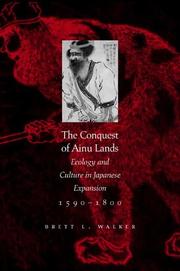
ISBN: 9780520248342 0520248341 0520227360 9780520227361 Year: 2006 Publisher: Berkeley University of California press
Abstract | Keywords | Export | Availability | Bookmark
 Loading...
Loading...Choose an application
- Reference Manager
- EndNote
- RefWorks (Direct export to RefWorks)
This model monograph is the first scholarly study to put the Ainu--the native people living in Ezo, the northernmost island of the Japanese archipelago--at the center of an exploration of Japanese expansion during the seventeenth and eighteenth centuries, the height of the Tokugawa shogunal era. Inspired by "new Western" historians of the United States, Walker positions Ezo not as Japan's northern "frontier" but as a borderland or middle ground. By framing his study between the cultural and ecological worlds of the Ainu before and after two centuries of sustained contact with the Japanese, the author demonstrates with great clarity just how far the Ainu were incorporated into the Japanese political economy and just how much their ceremonial and material life--not to mention disease ecology, medical culture, and their physical environment--had been infiltrated by Japanese cultural artifacts, practices, and epidemiology by the early nineteenth century. Walker takes a fresh and original approach. Rather than presenting a mere juxtaposition of oppression and resistance, he offers a subtle analysis of how material and ecological changes induced by trade with Japan set in motion a reorientation of the whole northern culture and landscape. Using new and little-known material from archives as well as Ainu oral traditions and archaeology, Walker poses an exciting new set of questions and issues that have yet to be approached in so innovative and thorough a fashion.
J4207 --- J3363 --- J3480 --- J7510 --- J4140.60 --- J4000.60 --- Ainu --- -Human ecology --- -Ecology --- Environment, Human --- Human beings --- Human environment --- Ecology --- Ecological engineering --- Human geography --- Nature --- Ainos --- Ethnology --- Japan: Sociology and anthropology -- communities -- native ethnicity and race --- Japan: History -- Kinsei, Edo period -- seclusion, sakoku (1639-1854), 18th century general --- Japan: Geography and local history -- Hokkaidō prefecture (Ezo) --- Japan: Natural sciences and technology -- biology -- ecology (general) --- Japan: Sociology and anthropology -- cultural history -- Kinsei, Edo, Tokugawa period, early modern (1600-1867) --- Japan: Social history, history of civilization -- Kinsei, Edo, Tokugawa period, early modern (1600-1867) --- History --- Social aspects --- Effect of environment on --- Effect of human beings on --- Hokkaido (Japan) --- Japan --- History. --- -Aïnou (Peuple d'Asie) --- Hokkaido (Japon) --- Ainu. --- Ainu-- History. --- Hokkaido (Japan) - History. --- Human ecology - Japan - Hokkaido. --- Aïnou (Peuple d'Asie) --- Nihon --- Nippon --- Iapōnia --- Zhāpān --- I︠A︡ponii︠a︡ --- Yapan --- Japon --- Japão --- Japam --- Mư̄ang Yīpun --- Prathēt Yīpun --- Yīpun --- Jih-pen --- Riben --- Government of Japan --- 日本 --- 日本国 --- Nipponkoku --- Nippon-koku --- Nihonkoku --- Nihon-koku --- State of Japan --- Япония --- Japani --- اليابان --- al-Yābān --- يابان --- Yābān --- Japonsko --- Giappone --- Japonia --- Japonya --- -Ainu --- Human ecology --- Ecologie humaine --- Histoire --- J4150.60 --- -J4207 --- Japan: Science and technology -- biology -- ecology (general) --- -Japan: Sociology and anthropology -- communities -- native ethnicity and race --- -Ainu - History --- Human ecology - Japan - Hokkaido --- Hokkaido (Japan) - History --- Japan - History - Tokugawa period, 1600-1868 --- Ainu - History --- Jepun --- Yapon --- Yapon Ulus --- I︠A︡pon --- Япон --- I︠A︡pon Uls --- Япон Улс --- -History --- History -
| Listing 1 - 9 of 9 |
Sort by
|

 Search
Search Feedback
Feedback About
About Help
Help News
News